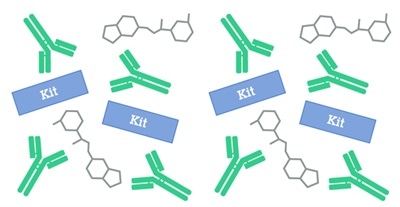Sponsored Content by AbcamMay 2 2019
Below is a list of high impact products for studies on the cyclin-dependent kinase (CDK) inhibitor p21 (also known as WAF1, CAP20, Cip1, and Sdi1). The tables show the most-cited research targets and widely-referenced products. Browse to understand better the effect of p21 in cellular function.

The p21 Toolkit
| Type |
Reagent name |
Description |
AbID |
Primary
antibody |
Anti-p21 antibody
|
Type: Rabbit monoclonal antibody
Reactivity: Hu
Applications: ICC/IF, Flow Cyt, WB, IP, IHC-P |
ab109520 |
Conjugated
primary
antibody |
Anti-p21 antibody |
Biotin conjugated |
ab79467 |
Recommended
secondaries |
Goat Anti-Rabbit IgG H&L |
Alexa Fluor® 488 conjugated |
ab150077 |
| HRP conjugated |
ab205718 |
| IRDye® 800CW (preadsorbed) |
ab216773 |
| Kit |
p21 SimpleStep ELISA® kit |
Quantitatively measure p21 in human cell and tissue extracts. Get fast, reproducible results in 90 minutes.
Reactivity: Hu
Range: 62.5 pg/ml - 4000 pg/ml
Method: Colorimetric |
ab214658 |
| Protein |
Recombinant p21 protein |
Human p21 protein for use in WB and as control1. |
ab56278 |
| Small molecule compound |
UC2288 (inhibitor)
*NEW* |
Selective p21 inhibitor structurally related to Sorafenib (ab141966). Inhibits cytosolic p21 (IC50 = 10 µM) and functions independently of p532,3. |
ab146969 |
| Tenovin-1 (activator) |
p21 activator and inducer of cell cycle arrest4. |
ab120889 |
Activation of p53-p21 Pathway
DNA damaging agents activate the p53-p21 pathway causing cell cycle arrest and DNA repair5. This mechanism is exploited by chemotherapeutic agents that induce p21 as a means of inhibiting cancer progression. Investigating p21 regulation in a p53-dependent or -independent manner can form a main basis of tumor suppression6,7.
| Reagent |
Type |
Purpose |
AbID |
| Oxaliplatin |
Inducer, inhibitor |
Exhibits dual role in p53-dependent and -independent pathways. Causes G0-G1 arrest in p53 wild type cells and p21 degradation in p53 mutants8. |
ab141054 |
| Nocodazole |
Inducer |
p21 inducer that increases expression of p21 in a p53-dependent fashion in absence of DNA damage9,10. |
ab120630 |
| Cycloheximide (CHX) |
Modulator |
Induction of p21 during serum stimulation (indicating serum contains a p21 blocking element)7. CHX traditionally acts as a p21 inhibitor promoting apoptosis in serum-starved cells11. |
ab120093 |
| PMA |
Inducer |
p53-independent p21 induction via Sp1 binding sites within p21 promoter12. |
ab120297 |
| Okadaic acid |
ab120375 |
References
- Sun, Z. et al. Increased SHP-1 expression results in radioresistance, inhibition of cellular senescence, and cell cycle redistribution in nasopharyngeal carcinoma cells. Radiat. Oncol. 10, 152 (2015).
- Wettersten, H. I. et al. A novel p21 attenuator which is structurally related to sorafenib. Cancer Biol. Ther. 14, 278–285 (2013).
- Liu, R., Wettersten, H. I., Park, S.-H. & Weiss, R. H. Small-molecule inhibitors of p21 as novel therapeutics for chemotherapy-resistant kidney cancer. Future Med. Chem. 5, 991–4 (2013).
- Wilking, M. J., Singh, C., Nihal, M., Zhong, W. & Ahmad, N. SIRT1 deacetylase is overexpressed in human melanoma and its small molecule inhibition imparts anti-proliferative response via p53 activation. Arch. Biochem. Biophys. 563, 94–100 (2014).
- He, G. et al. Induction of p21 by p53 following DNA damage inhibits both Cdk4 and Cdk2 activities. Oncogene 24, 2929–2943 (2005).
- Galanos, P. et al. Chronic p53-independent p21 expression causes genomic instability by deregulating replication licensing. Nat. Cell Biol. 18, 777 (2016).
- Macleod, K. F. et al. p53-dependent and independent expression of p21 during cell growth, differentiation, and DNA damage. Genes Dev. 9, 935–44 (1995).
- Hata, T. et al. Role of p21waf1/cip1 in effects of oxaliplatin in colorectal cancer cells. Mol. Cancer Ther. 4, 1585–1594 (2005).
- Lanni, J. S. & Jacks, T. Characterization of the p53-Dependent Postmitotic Checkpoint following Spindle Disruption. Mol. Cell. Biol. 18, 1055–1064 (1998).
- Linke, S. P., Clarkin, K. C., Di Leonardo, A., Tsou, A. & Wahl, G. M. A reversible, p53-dependent G0/G1 cell cycle arrest induced by ribonucleotide depletion in the absence of detectable DNA damage. Genes Dev. 10, 934–947 (1996).
- Arbel-Goren, R., Levy, Y., Ronen, D. & Zick, Y. Cyclin-dependent kinase inhibitors and JNK act as molecular switches, regulating the choice between growth arrest and apoptosis induced by galectin-8. J. Biol. Chem. 280, 19105–19114 (2005).
- Kennett, S. Sp3 encodes multiple proteins that differ in their capacity to stimulate or repress transcription. Nucleic Acids Res. 25, 3110–3117 (1997).
 About Abcam
About Abcam
Abcam is a global life sciences company providing highly validated antibodies and other binders and assays to the research and clinical communities to help advance the understanding of biology and causes of disease.
Abcam’s mission is to serve life scientists to help them achieve their mission faster by listening to their needs, continuously innovating and improving and by giving them the tools, data and experience they want. Abcam’s ambition is to become the most influential life science company for researchers worldwide.
Sponsored Content Policy: News-Medical.net publishes articles and related content that may be derived from sources where we have existing commercial relationships, provided such content adds value to the core editorial ethos of News-Medical.Net which is to educate and inform site visitors interested in medical research, science, medical devices and treatments.